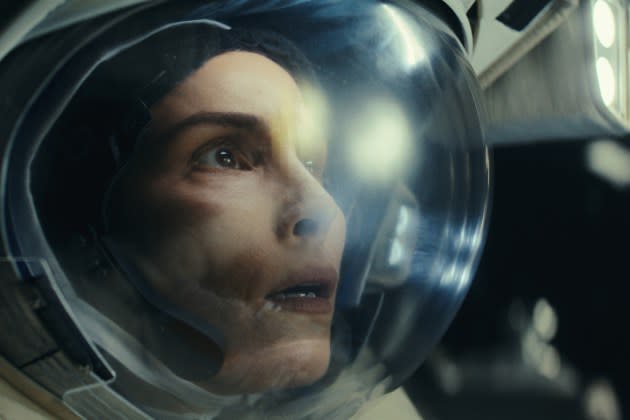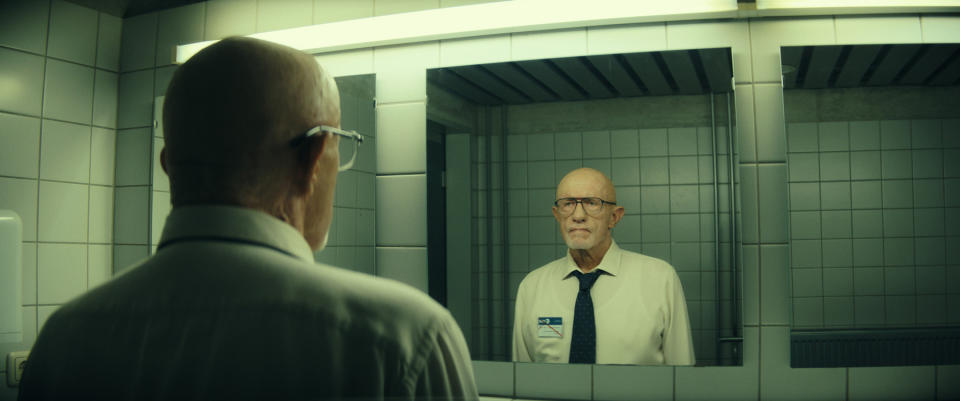‘Constellation’: In Space, No One Can Hear You Snore
- Oops!Something went wrong.Please try again later.
- Oops!Something went wrong.Please try again later.

The new Apple TV+ drama Constellation has atmosphere to spare. What it lacks is a story to live up to its creepy vibe.
Created by British TV vet Peter Harness, Constellation stars Noomi Rapace as Jo, a Swedish astronaut engaged in a long mission on the International Space Station. An experiment commissioned by celebrated astronaut-turned-scientist Henry (Jonathan Banks) goes tragically awry, and when Jo makes it back to Earth, everything feels off in some way. The family car is the wrong color. Her husband, Magnus (James D’Arcy), is convinced she’s having an affair that she has no memory of, and their once-bilingual daughter Alice no longer speaks Swedish. She keeps seeing things that shouldn’t be there, and her coworkers begin to worry that she’s experiencing a mental-health crisis, even as we in the audience get increasing evidence that reality is not what it should be, for any of these people. (There is a reason, for instance, that Banks is playing multiple roles, while Alice is played alternately by twins Rosie and Davina Coleman.)
More from Rolling Stone
How to Watch 'Messi's World Cup: The Rise of a Legend' Docuseries Online
To Serve Man And More: How to Watch Syfy's 'Twilight Zone' New Year's 2023 Marathon
The first two episodes were directed by Michelle MacLaren, one of TV’s modern masters when it comes to making the audience feel the same level of fear as the characters onscreen. (On Breaking Bad, she was responsible for the iconic “One Minute” shootout between Hank and the Cousins.) Her powers are on full display throughout these opening installments. The sequences in orbit are unnerving and chaotic; like Apple’s other astronaut drama, For All Mankind, this one understands how fundamentally dangerous space travel is at all times. And that’s before you get into all the aspects of this catastrophe that have no rational explanation, like the corpse of a Cold War-era cosmonaut embedded in a damaged section of the ISS.
It’s all an intriguing setup for … something. The problem is that Constellation is the latest streaming drama trying to stretch out two hours worth of plot so it will take up an eight-hour bag. Every idea is repeated, elongated, and then repeated again, until all that marvelous tension from the early chapters is gone long before the finale arrives. One episode shows us the events of the series so far from another perspective, which on the one hand helps provide clarity to what Jo is experiencing, but on the other hand feels like padding, because many of its points have been made multiple times already.
I went in knowing little other than the basic premise and the two leads, and assumed this was a limited series. After a while, I kept watching in part due to the sunk-cost fallacy, in part because I was at least curious to see how it all concluded — only to realize, to my dismay, that this was meant as an ongoing show, and that Harness believed multiple seasons will be necessary to tell this tale.

You know the “This meeting could have been an email” meme? Constellation is another in an unfortunately growing example of “This TV show should have been a movie.” And it probably would have been a good movie! Rapace and Banks are excellent as usual, in roles tailor-made to their strengths: guarded curiosity for her, world-weariness for him. The notion that space travel has a secret kind of danger that can follow astronauts back down to Earth has promise. Just not enough here, as Harness too often treats slowness as a virtue unto itself, without doing enough to make the patient approach feel worth it.
Two years ago, MacLaren served a similar director-producer role on another Apple series with a sci-fi twist: Shining Girls, where Elisabeth Moss was menaced by a time-traveling serial killer. That one was excellent enough that there was briefly talk of making additional seasons, even though the story wrapped up neatly by the last episode. Perhaps a one-and-done version of Constellation could have worked, since the episodes that genuinely advance our understanding of what’s happening are much stronger than the ones where Jo just goes around wondering why nothing is quite as she remembered it. But maybe we shouldn’t be surprised that a show that keeps doubling up various aspects of its heroine’s life should want to supersize everything, whether or not it make sense for the material.
The first three episodes of Constellation begin streaming Feb. 21 on Apple TV+, with additional chapters releasing weekly. I’ve seen all eight episodes.
Best of Rolling Stone

